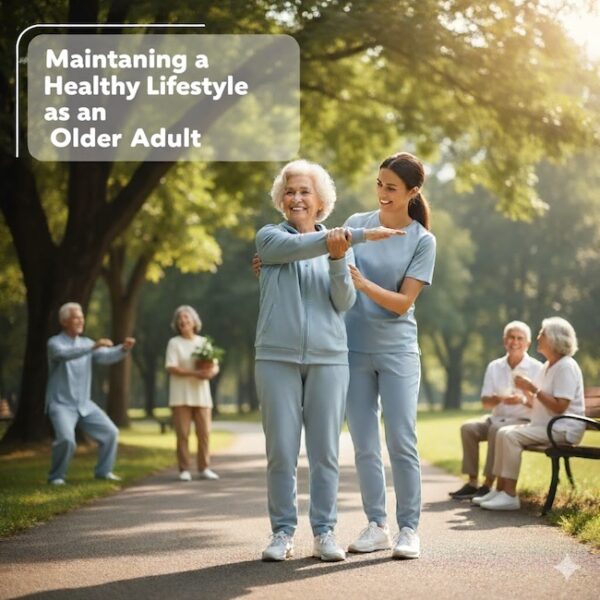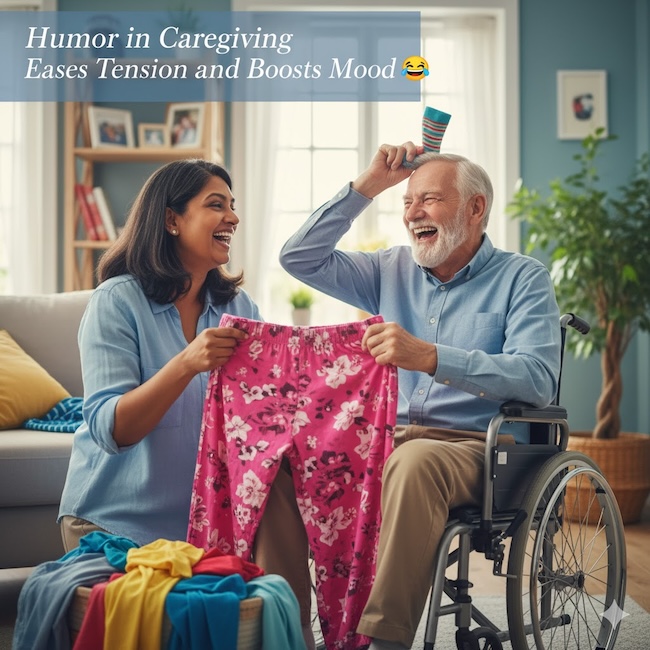If your loved one is considering aging in place, they might need encouragement to continue leading a healthy lifestyle that will keep them active longer. Jeff Salter from “Caring Senior Service” shares five tips to increase the chances that they’ll listen and make healthier choices.

The second half of our lives is a time when we start to slow down and reassess our lives as we consider the aging process.
But some gray hair and a slower pace of life are not reasons to forget healthy habits that will keep us active and living long, happy lives.
And if your older adult is considering aging in place, they might need encouragement to continue leading a healthy lifestyle.
However, many older people resist advice and change.
Use these five tips to help keep your interactions with your older adult positive and increase the likelihood that you can encourage them to make healthier choices as they age.
5 Ultimate Tips for Healthy Aging
1. Bring the Joy – Engage in Activities You Love
One of the best ways to encourage an active lifestyle is to help older adults continue participating in activities they love—especially those that keep their bodies and minds active.
For example, if they liked dancing in their youth, suggest they join a local dance class for their age group.
Or, if hiking is more their speed, find local groups that plan walks and low-impact hikes suitable for older participants.
And even if the things they enjoyed when they were younger didn’t involve physical activities, they can still enjoy the company of other older adults by taking art classes or joining book clubs.
Check with a local senior or community center to find out more about activities in the area—many are likely to be free or low-cost.
2. Stay in Shape – Workout Regularly
Regular movement and exercise are essential for older adults to stay healthy.
For those who prefer to exercise at home, there are plenty of options. Please encourage them to jog in place, walk laps around their home, follow online video or DVD exercise routines, work out with small weights, or try some yoga.
This keeps their heart healthy, improves circulation, boosts mood, and keeps joints mobile.
But not everyone is physically able to do standard exercise programs. For people with mobility issues, find exercise programs that can be done from a seated position, either online or on DVD.
3. Try New Foods
It’s also common for older people to lose interest in eating.
The National Institutes of Health reports that physiological changes can impair our appetites as we age.
Changes to the digestive system, hormonal changes, disease, pain, and even changes in taste, vision, and smell can make eating less appetizing.
This doesn’t mean that older adults have to stick to bland oatmeal or chalky meal substitutes.
With some creativity, you can help develop a meal plan that delivers the nutrients they need while appealing to their tastes and preferences.
Nutrient-dense foods like nuts, seeds, and avocados pack a punch without making your loved one feel too full or sluggish. You can also try finger foods and homemade fruit smoothies to help whet the appetite.
Making meals a social event can also help improve a low appetite. Eating with friends is stimulating and makes eating more fun.
Budget may also be a constraint in this situation. If so, it may help if you can pitch in for groceries, to help cook meals, or help host small get-togethers in their home.
4. See the Doctor Regularly (if Possible)
If your older adult is like most people, they might not love visiting the doctor. But it’s still vital that they see their doctors regularly.
It might help to remind them that well visits and recommended screenings are necessary to catch the early stages of many health issues, which increases the chances of curing long-term problems.
5. Avoid a Sedentary Lifestyle (move it or lose it)
Sometimes, no matter how creative we can get with exercise, meal plans, or social activities, an older adult may still refuse to participate.
Let’s face it: aging can be scary. Your older adult may feel they are losing their independence, and refusing to live a healthy lifestyle is one of the few things they still have some control over.
But you can give them some of their independence back by focusing on the positives.
Don’t tell them what to do or point out their limitations.
Instead, involve them in the solutions by working with them to find activities they like, meals they can prepare, and exercises they can do.
Help them find medical practitioners they like and trust, and find ways to ensure they can keep their appointments.
But if they need to take steps toward a healthier lifestyle and continue to refuse, you may need to enlist the help of professionals or trusted friends to persuade them.
If they aren’t listening to you or their doctors, try to include a best friend, a familiar caregiver, a social worker, or even a religious figure in the conversation.
They may not want to listen to your advice, but they might take advice from a peer or a professional.
Remember to also take care of yourself during these difficult times and take a break if you become too frustrated. Butting heads isn’t going to solve the problem.
And, if it gets to the point where your parents’ actions are hurting their health, you may need to take matters into your own hands and consult with their doctors to ensure that they get the care they need.
But don’t give up. Be calm, stay persistent, and realize that aging is a long process.
Final Thoughts
Remember, encouraging a healthy lifestyle is a marathon, not a sprint. Focus on progress, not perfection, and celebrate every small victory along the way. Whether it's a short walk, a new vegetable at dinner, or a good night's sleep, each positive choice contributes to a stronger, more vibrant life for your loved one.
Your supportive presence is the greatest motivator of all. So pick one or two ideas that feel manageable to you both, and start there. You've got this!
Recommended for you:
- 7 Steps to Take When Aging Parents Need Help
- This Guide Helps You Make a Caregiving Plan in 5 Steps
- Humor in Caregiving Eases Tension and Boosts Mood
Guest contributor: Caring Senior Service founder & CEO Jeff Salter began his career in senior care in 1991, working for a home health care agency in Odessa, Texas. Four months later, he started his own senior care service to provide seniors with the non-medical care they need to stay at home. In 2003, Caring Senior Service began offering franchises and today has nearly 50 locations across the United States.













